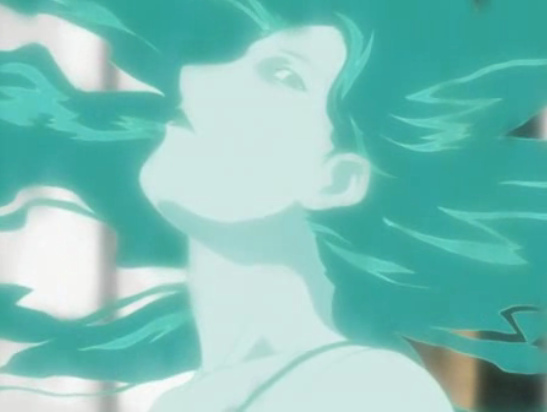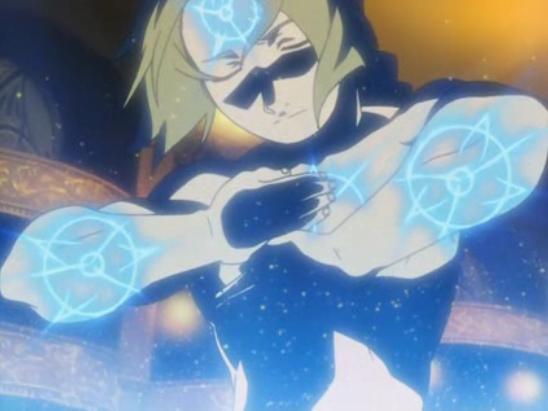Don't look away, Rose! You need to see what happens when you try to bring a human to life, when you cross into God's territory or whatever the hell it is! Is this what you want?! -Edward, Episode 1
Humankind cannot gain anything without first giving something in return. To obtain, something of equal value must be lost. That is alchemy's first law of Equivalent Exchange. In those days, we really believed that to be the world's one, and only truth. -Alphonse, Opening Sequence
As an almost universal rule, I loathe long-running anime series. Tiresome and pointless shows with emotionless plot arcs and minimal character development such as Dragonball Z and Inuyasha plagued my youth, when my access to anime was limited to Toonami and (later) Adult Swim. Even Naruto, a series in which meaningful plot events take place and characters change significantly over time (a rarity in its genre), eventually ran too long and too thin for me to care any longer, and that was six years ago (the series is still ongoing).
Fullmetal Alchemist (2003) is different. First of all, at 51 episodes and one feature length film, it's not nearly as long as other long-running shonen. It's a series with a very intent and simple purpose: find the Philosopher's Stone and get the Elric boys' bodies back. For the Elric brothers, this singularity of purpose gives their lives a certain direction and urgency which those around them often envy or admire (sometimes both). So, too, should other series creators envy and admire what Fullmetal Alchemist achieved. It is a show which told a grand, expansive tale with many characters and a complex universe, but kept the series tightly focused on two characters and their quest.
The show's flash-forward/flash-back approach to its beginning is not a new invention, but it's better executed here than in any other series I've seen. It kicks off with the heart-rending, incredibly intense human transmutation scene which sets the show's plot in motion. It's amazing how much character and emotion is imported into the first two minutes of screentime: Edward and Alphonse are instantly engaging and vivid. The flashback is not merely to set up the show, either. It is thematically tied to the two-parter which opens the series. By the end of the episode, we know so many things about the world: the Philosopher's Stone, the status of a State Alchemist, the taboo on human transmutation, Edward's height complex and brashness, Alphonse's humility and kindness, and we see the characters surrounding them: scared, desperate people who cannot accept death. We even get a glimpse into the cosmology of the world: while Edward mocks Rose's blind faith, he's no atheist. He knows that there's some cosmic power out there, but it's crueler and craftier than any benevolent God from a holy book.
The two-parter comes to a horrifying, violent conclusion as it introduces yet another key element: chimeras. The series is fascinated by aberrations of nature and cruelty to animals, concurrent with the theme of unethical science. In the episodes leading up to Scar's introduction, the series in many ways shows just how right he is: alchemists are cruel to animals and often even other people (especially those close to them), they create delusions of grandeur, and they cannot cope with death or failure like normal people. Refusing to ease off the intensity, the show jumps back to the brothers' origin story in "Mother," as Alphonse's narration and the haunting image of their parents disappearing from their lives determines the show's themes more beautifully and concisely than even the best-written anime theme songs.
There's a great deal going on in Fullmetal Alchemist intellectually, far more than most action-driven shonen. However, it's ultimately about two things: family and death. There's a common stereotype that teenagers think they're invincible, that they are reckless and carefree due to an inability to conceptualize mortality. Fullmetal Alchemist is a show about two teenage boys, in which the frailty of human life and the finality of death are made more clear by the supernatural elements, not less so. By the seventh episode, which climaxes with a harrowing chase scene and an almost equally harrowing near-murder once the tables turn in Edward's favor, the audience is thoroughly convinced of the fact that while the protagonists are children, the series creators are not afraid of showing tremendous violence done to them. Despite his status as the titular character (and of course, a teenager), Edward is shown to be far from invincible.
The homunculi are perfect villains for the story's theme: they are both aberrations of nature (specifically their near-indestructibility) and products of failed human transmutations. Sloth in particular is a tremendously powerful villain because she represents the alchemist's ultimate dream and ultimate fear: conquering death and failing, respectively. Indeed, while he accepts the finality of death early on, much of Edward's character arc is his coming to grips with failure, and the innate inability to apply his scientific genius to his personal life. While also not an uncommon theme with immortal characters, the homunculi's hatred of their immortality is made all the more powerful by the alchemists' dogged attempts to achieve it. The deaths in the show, even of minor characters and villains, hit you like a ton of bricks. Despite the occasional over-the-top action scene, the violence can become very gruesome, bloody and shockingly realistic when it needs to be. Although Seiji Mizushima's direction on Neon Genesis Evangelion was brief (and for a rather ill-conceived episode), one crucial lesson he seemed to take away from the series was the way to compare physical trauma and psychological trauma.
Arguably the most memorable death on the show is that of a very minor character at the time: Nina, the daughter of the psychotic Shao Tucker. Not only does this sequence explain the show's themes in a memorable fashion-- Tucker himself is all that Edward fears he could become, and is set up as a symbol of alchemists' curious brand of psychosis-- it becomes the emotional focal point for the rest of the series. When Tucker is brought back near the end, it all makes a kind of terrible sense, as Edward is once again brought face-to-face with the taboos of alchemy, now with full knowledge of the philosopher's stone. His first transgression was as a child; now as a near-adult, there's a real chance that Edward will falter in his pursuit of an ethical solution to his problems. The first time was tragedy, the second time could merely be farce.
In its own way, the original Fullmetal Alchemist serves as an argument for the art of adaptation. The series continued through a radically different plotline from the manga, as a result of its production moving along more quickly than Hiromu Arakawa was writing the manga. But Sho Aikawa, troublesome writer that he is with regards to some of his other projects, wound up pulling the series together into a deeply emotional, thematically consistent work. There is no doubt that the plotline with Dante and Van Hohenheim is deeply weird, poorly explained and out of left field from the rest of the story (not to mention the alternate universe aspect which was only hinted at before the last two episodes). But the homunculi-- particularly Lust, Sloth, Wrath and Envy-- are the real antagonists of the story, and serve as excellent foils to the Elric boys (particularly the latter two).
Aikawa wrote a story based around the Elric brothers' maturation, the way their relationship deepened and changed with the new trials they were faced with, and most importantly wrote a story which rose and fell on them, with no extraneous characters complicating the ending. Fullmetal Alchemist is a series about family and death, put upon a backdrop of questions regarding unethical science, government, karma, and the cosmos. The final conversations of the series revolve around the show's own philosophy of equivalent exchange, and most importantly it calls itself out on its limitations. What's more, it implied that it would this whole time. "In those days, we really believed that to be the world's one, and only truth" Alphonse says. He almost sounds incredulous saying it, blown away by a child's polarized worldview, and now conscious of the many ambiguities and moral grey areas of life. That's what Fullmetal Alchemist does unlike any other show I've seen: it shows a childish view of the world and explains in detail-- without being condescending or overly cynical-- that any worldview which is black-and-white, overly rigid, or based on a singular rule is going to be limited and ultimately erroneous. Despite its admitted flaws, Fullmetal Alchemist is an astonishing achievement, one which its "sequel" series, as it were, unfortunately did not live up to. More on that next time.





No comments:
Post a Comment